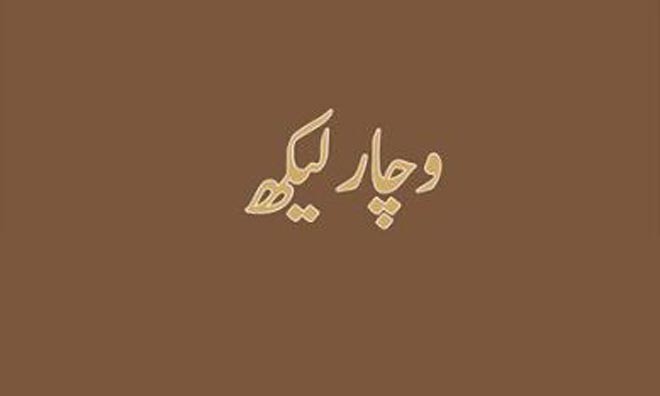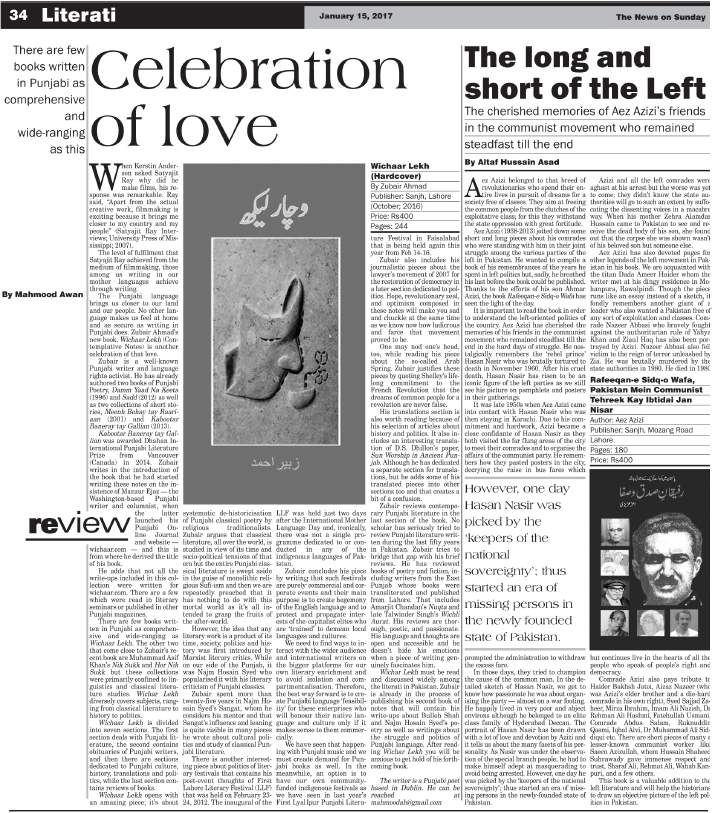Mahmood Awan (The News on Sunday, 15th January 2017)
When Kerstin Anderson asked Satyajit Ray why did he make films, his response was remarkable. Ray said, “Apart from the actual creative work, filmmaking is exciting because it brings me closer to my country and my people” (Satyajit Ray Interviews; University Press of Mississippi; 2007).
The level of fulfilment that Satyajit Ray achieved from the medium of filmmaking, those among us writing in our mother languages achieve through writing.
The Punjabi language brings us closer to our land and our people. No other language makes us feel at home and as secure as writing in Punjabi does. Zubair Ahmad’s new book, Wichaar Lekh (Contemplative Notes) is another celebration of that love.
Zubair is a well-known Punjabi writer and language rights activist. He has already authored two books of Punjabi Poetry, Damm Yaad Na Keeta (1996) and Sadd (2012) as well as two collections of short stories, Meenh Bohay tay Baariaan (2001) and Kabootar Baneray tay Gallian (2013).
Kabootar Baneray tay Gallian was awarded Dhahan International Punjabi Literature Prize from Vancouver (Canada) in 2014. Zubair writes in the introduction of the book that he had started writing these notes on the insistence of Manzur Ejaz — the Washington-based Punjabi writer and columnist, when the latter launched his Punjabi Online Journal and website — wichaar.com — and this is from where he derived the title of his book.
He adds that not all the write-ups included in this collection were written for wichaar.com. There are a few which were read in literary seminars or published in other Punjabi magazines.
There are few books written in Punjabi as comprehensive and wide-ranging as Wichaar Lekh. The other two that come close to Zubair’s recent book are Muhammad Asif Khan’s Nik Sukk and Hor Nik Sukk but these collections were primarily confined to linguistics and classical literature studies. Wichar Lekh diversely covers subjects, ranging from classical literature to history to politics.
Wichaar Lekh is divided into seven sections. The first section deals with Punjabi literature, the second contains obituaries of Punjabi writers, and then there are sections dedicated to Punjabi culture, history, translations and politics, while the last section contains reviews of books.
Wichaar Lekh opens with an amazing piece; it’s about systematic de-historicisation of Punjabi classical poetry by religious traditionalists. Zubair argues that classical literature, all over the world, is studied in view of its time and socio-political tensions of that era but the entire Punjabi classical literature is swept aside in the guise of monolithic religious Sufi-ism and then we are repeatedly preached that it has nothing to do with this mortal world as it’s all intended to grasp the fruits of the after-world.
However, the idea that any literary work is a product of its time, society, politics and history was first introduced by Marxist literary critics. While on our side of the Punjab, it was Najm Hosain Syed who popularised it with his literary criticism of Punjabi classics.
Zubair spent more than twenty-five years in Najm Hosain Syed’s Sangat, whom he considers his mentor and that Sangat’s influence and leaning is quite visible in many pieces he wrote about cultural politics and study of classical Punjabi literature.
There is another interesting piece about politics of literary festivals that contains his post-event thoughts of First Lahore Literary Festival (LLF) that was held on February 23-24, 2012. The inaugural of the LLF was held just two days after the International Mother Language Day and, ironically, there was not a single programme dedicated to or conducted in any of the indigenous languages of Pakistan.
Zubair concludes his piece by writing that such festivals are purely commercial and corporate events and their main purpose is to create hegemony of the English language and to protect and propagate interests of the capitalist elites who are ‘trained’ to demean local languages and cultures.
We need to find ways to interact with the wider audience and international writers on the bigger platforms for our own literary enrichment and to avoid isolation and compartmentalisation. Therefore, the best way forward is to create Punjabi language ‘feasibility’ for these enterprises who will honour their native language and culture only if it makes sense to them commercially.
We have seen that happening with Punjabi music and we must create demand for Punjabi books as well. In the meanwhile, an option is to have our own community-funded indigenous festivals as we have seen in last year’s First Lyallpur Punjabi Literature Festival in Faisalabad that is being held again this year from Feb 14-16.
Zubair also includes his journalistic pieces about the lawyer’s movement of 2007 for the restoration of democracy in a later section dedicated to politics. Hope, revolutionary zeal, and optimism composed in these notes will make you sad and chuckle at the same time as we know now how ludicrous and farce that movement proved to be.
One may nod one’s head, too, while reading his piece about the so-called Arab Spring. Zubair justifies these pieces by quoting Shelley’s lifelong commitment to the French Revolution that the dreams of common people for a revolution are never false.
His translations section is also worth reading because of his selection of articles about history and politics. It also includes an interesting translation of D.S. Dhillon’s paper, Sun Worship in Ancient Punjab. Although he has dedicated a separate section for translations, but he adds some of his translated pieces into other sections too and that creates a bit of a confusion.
Zubair reviews contemporary Punjabi literature in the last section of the book. No scholar has seriously tried to review Punjabi literature written during the last fifty years in Pakistan. Zubair tries to bridge that gap with his brief reviews. He has reviewed books of poetry and fiction, including writers from the East Punjab whose books were transliterated and published from Lahore. That includes Amarjit Chandan’s Nuqta and late Talwinder Singh’s Wichli Aurat. His reviews are thorough, poetic, and passionate. His language and thoughts are open and accessible and he doesn’t hide his emotions when a piece of writing genuinely fascinates him.
Wichar Lekh must be read and discussed widely among the literati in Pakistan. Zubair is already in the process of publishing his second book of notes that will contain his write-ups about Bulleh Shah and Najm Hosain Syed’s poetry as well as writings about the struggle and politics of Punjabi language. After reading Wichar Lekh you will be anxious to get hold of his forthcoming book.
Wichaar Lekh (Hardcover)
By Zubair Ahmad
Publisher: Sanjh, Lahore (October; 2016)
Price: Rs400
Pages: 244
Published on 15th January 2017 in The News on Sunday.
https://www.thenews.com.pk/tns/detail/562491-celebration-love


